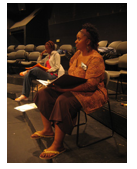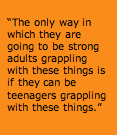Talking with Juanita Rodrigues at Boston Arts Academy
Juanita Rodrigues teaches theatre at the public pilot school Boston Arts Academy—“a laboratory and a beacon for artistic and academic innovation.” In 2005-2006, an ensemble of male students of color worked with Rodrigues to develop Soul Element, an hour-long performance tackling issues of violence, prejudice, and apathy that affect many minority males. Abe Louise Young interviewed Rodrigues about her teaching philosophy between rehearsals, in June 2006.
WKCD: How does Theatre affect students’ academic work and their learning throughout school?
 RODRIGUES: Theatre, in general, teaches kids to be risk-takers, teaches kids to be able to express themselves, teaches kids how to be able to work in an ensemble, how to be able to work in a group.
RODRIGUES: Theatre, in general, teaches kids to be risk-takers, teaches kids to be able to express themselves, teaches kids how to be able to work in an ensemble, how to be able to work in a group.
Also, finding their voice. Finding their voice as writers. They’re always awestruck as to what comes out of them. Finding their voice in terms of, ‘Who I am as a man or a woman?’ You see kids going from being really timid, be they male or female, to slowly becoming more risk-takers. And part of the process is, What are you hiding from? For girls, it tends to be power and strength; for guys, it tends to be vulnerability.
WKCD: Why do you work with teenagers?
RODRIGUES: I believe that working with teens is my calling. I want to be able to empower them so that they can do a couple of things. One, so they can look at society and have an opinion about what’s going on. Two, so they can voice that opinion, and they can find out ‘what is my artistic voice, how can I impact someone through my art?’ And to realize that that they are not too young to do so. hat’s what I want to encourage them to be able to do.
WKCD: What is the sequence of learning that you set up for theatre students?
RODRIGUES: The whole freshman year is basically around self-awareness. We feel as though they need to know who they are before they can become somebody else. So it’s waking them up to Self, waking up to environment, and then honestly waking up to each other. They go through a process of exercises, a process of being sensitive, a process of trust building.
The sophomore year curriculum is based on looking at issues, along the idea of Dominant Ideologies—racism, sexism, classism, and homophobia. This comes in to play in terms of the selection of material that we work with, and in terms of the plays that they do their scenes from.
The bottom line is I want artists who are trained, even though I have all this stuff that-- I’m teaching what I’m teaching— but when they’re on the stage, they have to be good.
I select plays that talk about issues that I want them to grapple with, so that then when they’re getting into these characters, in the world of the play, they’re having to talk about racism, they’re having to talk about sexism, they’re having to talk about dealing with angels. That’s the tenth grade year.
Eleventh grade year, then they go more into the styles of acting. Then as seniors, they go to their playwriting unit and the directing unit.
WKCD: How do you make the classroom space safe to deal with difficult topics, like racism?
 RODRIGUES: The only way in which they are going to be strong adults grappling with these things is if they can be teenagers grappling with these things. So they’re honest and raw and go at it, they talk and cry.
RODRIGUES: The only way in which they are going to be strong adults grappling with these things is if they can be teenagers grappling with these things. So they’re honest and raw and go at it, they talk and cry.
First we have a discussion about my personal opinion: that people don’t talk about race because they’re afraid of the label ‘racist.’ “If you’re growing up in America,” I tell them, “we all prejudge.” So it’s about looking at how we prejudge and how we feel about certain things. And then when we see ourselves as doing it, putting ourselves in check.
I put myself up there with them, so I’m part of the ensemble. I share my growth process. I give benign examples, like, If I’m driving in a car and a [white] guy does something stupid, I become even more angry because they do it to us all the time…so I put myself in check—[to myself] I’m like, “That’s not cool.”
I share those things with them so they can see that I’m still on this journey, too. The kids that are white know that I love them, so they’re able to hear it. They’re able to talk about the stuff they go through and the stuff that they feel. If you’re not transparent, and obviously transparent (with boundaries,) I don’t think this work is possible.
It has to do with discipline, with commitment. But more importantly, it has to do with, What type of man or woman do you want to be? How do you feel about society? What do you have to say about society? How are you navigating the realities in which we live? How are you able, as a person of color, to grow up in a racist society and still take people as individuals? How do we work that thing out?
My philosophy for my theatre class is that theatre class isn’t where you come to perform. I don’t want to see performances. I can’t stand acting. It’s where you come to work things out. And what we’re in the process of doing is continuously working things out, a process of continual exploration, regardless of what that specific point of convocation is.


